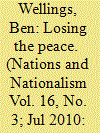| Srl | Item |
| 1 |
ID:
098150


|
|
|
|
|
| Publication |
2010.
|
| Summary/Abstract |
Political resistance to European integration in the UK laid important ideological foundations for contemporary English nationalism. The politics surrounding accession to the European Economic Community (EEC) was such that it signalled that accession was a matter of supreme national importance and, via the device of a referendum, it led to the fusing of parliamentary and popular sovereignty. The unfolding of the Thatcherite project in Britain added an individualistic - and eventually an anti-European - dimension to this nascent English nationalism. Resistance to the deepening political and monetary integration of Europe, coupled with the effects of devolution in the UK, led to the emergence of a populist English nationalism, by now fundamentally shaped by opposition to European integration, albeit a nationalism that merged the defence of British and English sovereignty. Underpinning these three developments was a popular version of the past that saw 'Europe' as the ultimate institutional expression of British decline. Thus Euroscepeticism generated the ideology of contemporary English nationalism by legitimising the defence of parliamentary sovereignty through the invocation of popular sovereignty underpinned by reference to the past.
|
|
|
|
|
|
|
|
|
|
|
|
|
|
|
|
| 2 |
ID:
158416


|
|
|
|
|
| Summary/Abstract |
In the wake of the Afghan missions, this article assesses the appetite in Australia and New Zealand for an ongoing relationship with NATO. Australia and New Zealand share many commonalities in their cultural, political, and economic profiles. Yet their identities in the realm of defense and security differ subtly, which has important implications for the reception of NATO’s strategic narratives in the Indo-Asia-Pacific region. Drawing on strategic narrative theory (SNT), we assess perceptions of NATO in Australia and New Zealand. By collecting and analyzing empirical data from political, academic, and military elites, we find that there is a keen desire for an on-going partnership with NATO, particularly in maintaining interoperability and in the area of “emerging security challenges.” Although the findings were mostly positive for NATO, New Zealand elites were more reticent about NATO involvement than those in Australia, where elites saw NATO and the Global Partnership as a potentially useful – if under-utilized – asset in areas of non-traditional security cooperation.
|
|
|
|
|
|
|
|
|
|
|
|
|
|
|
|